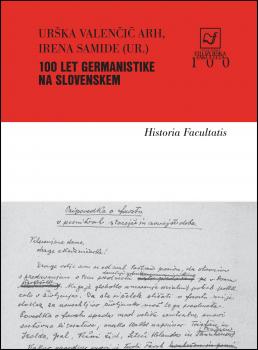100 let germanistike na Slovenskem
Keywords:
German studies, Faculty of Arts, University of Ljubljana, SloveniaSynopsis
This monograph on 100 years of German studies in Slovenia provides a comprehensive overview of the development of German Studies at the University of Ljubljana’s Faculty of Arts. German philology was one of the academic streams in which students could enrol already in 1919/20, the University’s first year of operations. The first lectures began in the summer semester of 1920. This monograph is divided into three parts. The first part, historia, provides an in-depth history of the Department. It particularly illuminates the first twenty years of German studies, which were shaped primarily by the first department head, the Nestor of German Studies, Jakob Kelemina. In addition to surveying the subjects covered in the lectures and seminars he offered, this part presents the first generation of German students, as well as other German Studies scholars who have left a lasting mark on Slovenian cultural memory. The introductory chapter also presents some statistics related to German Studies at the University of Ljubljana – from the number of students by individual year, to the proportion of students to the number of graduates. The second, historically oriented, chapter deals with the development of the Department of Germanic Studies after 1945. The former “Seminar on Germanic Philology” was eventually transformed into the Department of Germanic Languages and Literatures. In 1998 the Department was divided into the Department of German, Dutch and Swedish and the Department of English and American Studies. The second part of the monograph, praesentia, focuses on the development of individual chairs or divisions in the department, the Dutch and Swedish language sections, and the presentation of the library. In this regard it, also takes into account all who have lectured and taught in the Department since it was founded, while covering all the international links and projects the Department has cultivated. Also important is the chapter about the extracurricular work of German students. The third part, memoria, concerns itself with those who co-created German Studies in the past – or who experienced it first-hand. Many former colleagues have recorded their memories of studying and working at the Department; a special chapter is dedicated to all those who studied at the University of Ljubljana and who continued their careers in the Department of German Studies at the University of Maribor. In addition, some Department alumni are given the floor: their memories of studying German, of individual professors, and of particular lectures round off the overall image of the development of German Studies in Slovenia
Chapters
-
Prvih 100 let
-
Vzpon in padec germanske filologije na Univerzi v Ljubljani – od 1919 do 1949
-
Od germanistike do germanistike: pot v samostojnost 1950–2019
-
Oddelek se predstavi
-
Spominjanja
-
Povzetek
-
Zusammenfassung
-
Summary
Downloads

Published
Series
License

This work is licensed under a Creative Commons Attribution-ShareAlike 4.0 International License.

